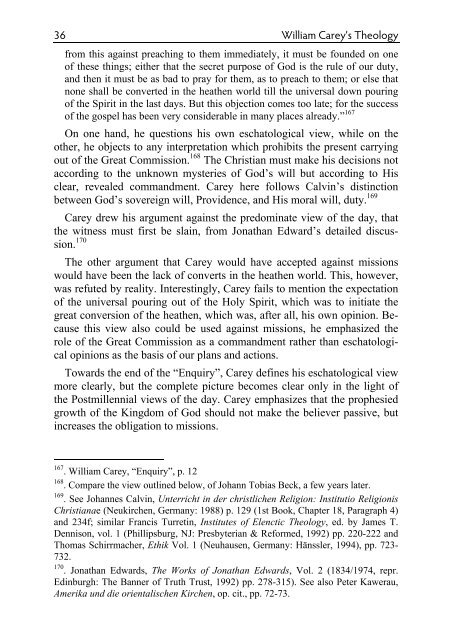William Careys Theology - World Evangelical Alliance
William Careys Theology - World Evangelical Alliance
William Careys Theology - World Evangelical Alliance
Create successful ePaper yourself
Turn your PDF publications into a flip-book with our unique Google optimized e-Paper software.
36 <strong>William</strong> Carey’s <strong>Theology</strong><br />
from this against preaching to them immediately, it must be founded on one<br />
of these things; either that the secret purpose of God is the rule of our duty,<br />
and then it must be as bad to pray for them, as to preach to them; or else that<br />
none shall be converted in the heathen world till the universal down pouring<br />
of the Spirit in the last days. But this objection comes too late; for the success<br />
of the gospel has been very considerable in many places already.” 167<br />
On one hand, he questions his own eschatological view, while on the<br />
other, he objects to any interpretation which prohibits the present carrying<br />
out of the Great Commission. 168 The Christian must make his decisions not<br />
according to the unknown mysteries of God’s will but according to His<br />
clear, revealed commandment. Carey here follows Calvin’s distinction<br />
between God’s sovereign will, Providence, and His moral will, duty. 169<br />
Carey drew his argument against the predominate view of the day, that<br />
the witness must first be slain, from Jonathan Edward’s detailed discussion.<br />
170<br />
The other argument that Carey would have accepted against missions<br />
would have been the lack of converts in the heathen world. This, however,<br />
was refuted by reality. Interestingly, Carey fails to mention the expectation<br />
of the universal pouring out of the Holy Spirit, which was to initiate the<br />
great conversion of the heathen, which was, after all, his own opinion. Because<br />
this view also could be used against missions, he emphasized the<br />
role of the Great Commission as a commandment rather than eschatological<br />
opinions as the basis of our plans and actions.<br />
Towards the end of the “Enquiry”, Carey defines his eschatological view<br />
more clearly, but the complete picture becomes clear only in the light of<br />
the Postmillennial views of the day. Carey emphasizes that the prophesied<br />
growth of the Kingdom of God should not make the believer passive, but<br />
increases the obligation to missions.<br />
167 . <strong>William</strong> Carey, “Enquiry”, p. 12<br />
168 . Compare the view outlined below, of Johann Tobias Beck, a few years later.<br />
169 . See Johannes Calvin, Unterricht in der christlichen Religion: Institutio Religionis<br />
Christianae (Neukirchen, Germany: 1988) p. 129 (1st Book, Chapter 18, Paragraph 4)<br />
and 234f; similar Francis Turretin, Institutes of Elenctic <strong>Theology</strong>, ed. by James T.<br />
Dennison, vol. 1 (Phillipsburg, NJ: Presbyterian & Reformed, 1992) pp. 220-222 and<br />
Thomas Schirrmacher, Ethik Vol. 1 (Neuhausen, Germany: Hänssler, 1994), pp. 723-<br />
732.<br />
170 . Jonathan Edwards, The Works of Jonathan Edwards, Vol. 2 (1834/1974, repr.<br />
Edinburgh: The Banner of Truth Trust, 1992) pp. 278-315). See also Peter Kawerau,<br />
Amerika und die orientalischen Kirchen, op. cit., pp. 72-73.
















